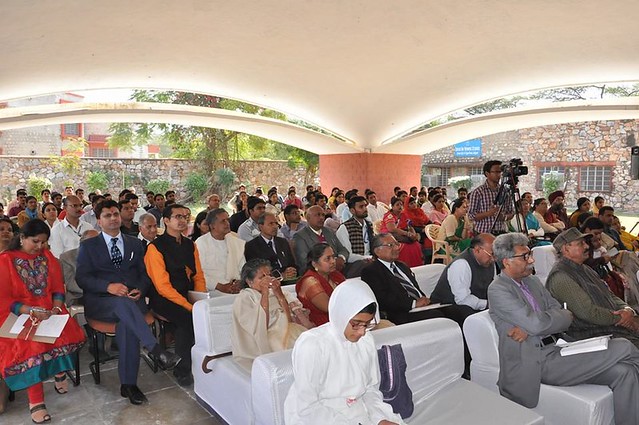Gandhian legacy in the twenty first century
(Guest of honour address, the International Seminar on Tradition of Nonviolence: Changing Contexts, 14-15 February 2015, Jaipur, India)
Dr. Janjira Sombatpoonsiri
Co-Secretary General, Asia-Pacific Peace Research Association (APPRA)
Lecturer, Faculty of Political Science, Thammasat University
Namaste. Good morning your excellencies, distinguished scholars, ladies and gentleman. First of all I would like to thank Prof. Vidya Jain, director of the Centre for Gandhian Studies, University of Rajasthan, for kindly inviting me to this wonderful gathering of nonviolence scholars and practitioners.
As a guest of honour, I am honoured to share an anecdote of Gandhi’s legacy in the faraway land. Of course, we are all familiar with Gandhi’s influence on nonviolent movements in many societies, especially in South Africa (anti-Apartheid movement) and the United States (civil rights movement). In Thailand where I am from, the term ‘Ahimsa’ has been a popular association with protests against authoritarian governments. The newly released volume on Gandhian legacy in resistance movements around the globe can tell you the large extent Gandhi’s concept and practice of nonviolence has been globalised. But what strikes me is not how these movements have adopted Gandhi’s nonviolence in the orthodox sense, but rather, how they adapted it to their own political and cultural contexts.

During my PhD, I was drawn to Serbia, the country that has been through seven major wars which took more than 11 million lives. Despite this miserable backdrop, the Serbian freedom fighters of the 1990s have the reputation of being creative, resilient and humorous. And yes, I was researching into these hilarious protest actions so as to understand how humour works as a vehicle of nonviolent struggle.
During my interviews with the activists, I often came across the statement that their commitment to nonviolent action was inspired by Gandhi. I thought “Wow! it is so fantastic to hear about legacy of Gandhi’s nonviolence in another continent, in a different political landscape and cultural setting. But the story doesn’t end there. The Serbian nonviolent movement was also inspired by the British comedy called the Monty Pythons popular in the 1980s. Moreover, their sense of contempt against the dictatorial Milosevic government was influenced by Serbian history of rebellion against the Ottoman Empire. These are eclectic elements shaping one social movement, and as we can see their underpinning values clash with one another. For instance, despite Gandhi’s famous sense of humour, I don’t think it is similar to the Monty Pythons’ situational jokes. Or I don’t think that Gandhi would have initiated a protest slogan that reads “Sloba (Milosevic’s nickname) save Serbia, kill yourself.” In this sense, nothing is typically “Gandhian” in the Serbian nonviolent movement, and yet Gandhi’s legacy is present. Perhaps, a word that could reconcile us with such a paradox is ‘changing context,’ which is the title of this international seminar.

Social movements around the world have increasingly relied on nonviolence; from the street of Cairo to Hong Kong, from Thailand to the U.S.’ Occupy Movements, from Ukraine to Myanmar, from Sudan to Turkey, from Fiji to Spain, and many more. These movements do so by re-interpreting what nonviolence means and how it can work in their specific polity. As a result, nonviolence at dawn of the twentieth century in Serbia has a much different manifestation than in the early twentieth of India. It is this changing context of nonviolence that I believe encourages our enthusiastic participation in this seminar which aims to move beyond the orthodoxy of existing debates in nonviolence. The seminar is highly relevant because it pays attention to revising the meanings of non-violence amidst fast changing global contexts.
As the co-Secretary General of the Asia-Pacific Research Association or APPRA, I would like to emphasise that our organisation shares this mission, anticipating to strengthen peace research community to battle the disease of ignorance and violence. I do trust that India and the Centre for Gandhian Studies, University of Rajasthan, constitutes a crucial part of this community. This seminar is hence a sign of cooperation and hope for a more robust peace research community. Thank you.



